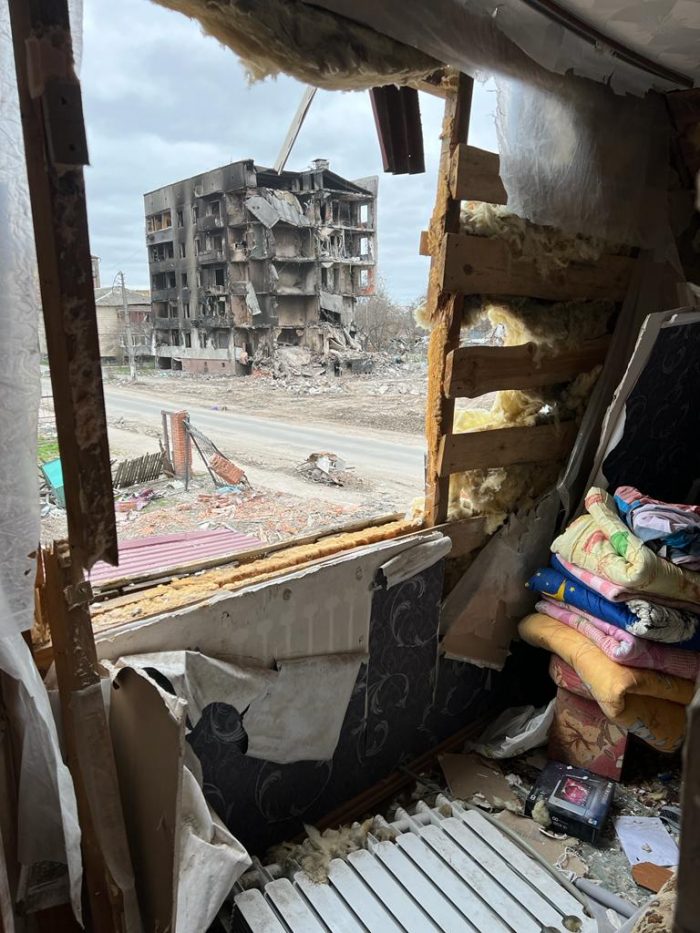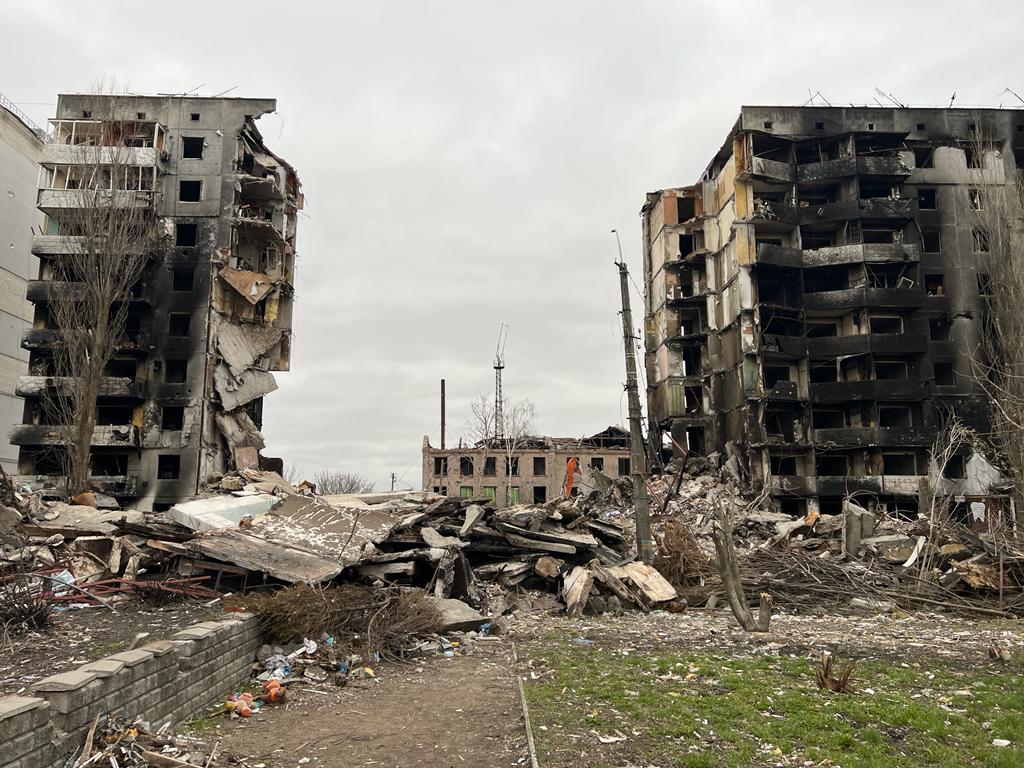“I watched the jets fly twenty metres above me,” local parish priest Father Dmytry recalls the moment Russian bombers attacked a row of three high-rise residential apartment blocks just a few hundred metres from his church in Borodyanka town. “They deposited the first bombs, then circled back and five minutes later, they hit again.”
Forty-five days later, the bodies of dozens of civilian residents who scrambled to the basements when the air raid started, lay crushed under the weight of debris from the collapsed nine-storey apartment blocks. “They were told not to evacuate, but to hide in the basements,” Father Dmitry continues, “but the basement became their graveyard. They would have been better out on the streets.”
All that’s standing from one of the deadliest attack on Ukraine’s civilian population since the start of the Russian invasion are the remnants of the buildings’ blackened shell. Crushed into the debris beneath are the family belongings and personal memories of those who managed to escape the attack and the grisly remains of those who didn’t.
Many of its 13,000 residents have trickled back into Borodyanka a week after the town’s liberation from its month-long ordeal. As mobile phone reception and gas heating returns, fear is dissipating but uncertainty remains. According to residents two hundred people are unaccounted for. How many fled the town, were abducted by the retreating Russian forces or still remain under the rubble is anyone’s guess. Forty-five days after the bombing, all hopes of saving any lives have ended. “A homeless woman heard voices from under the rubble three weeks ago,” Father Dmitry told The Currency, “She told the emergency workers who took out four people alive. Since then, there have been no voices.”
Twenty years of service at the Church of the Nativity of the Blessed Virgin Mary has placed Father Dmitry at the centre of Borodyanka’s community. In the days leading up to the invasion, he helped evacuate 1500 residents and he was part of the town’s territorial army defence, an untrained volunteer regiment armed only with machine guns, “There were 200 of us and I know 80 were killed by the Russians,” he said. “There was no proper Ukrainian army to protect us. The Russians just rolled in and took over.”

In black cassock and flat hat, Father Dmitry watches carefully over a crowd of 200 residents queuing at his church for food donations. Attentive and business-like when asked for updates on food deliveries, there’s no hiding his bitterness over the attacks on his community.
“You wouldn’t want any other place to experience what we’ve gone through. It’s been really frightening. First of all, there was the fear when the water runs out. You have to leave the house to find more. But if you left, snipers on the roofs would shoot you. Can you imagine? They didn’t even let people take water from the well. Many families tried to escape by just getting into their cars, but they were killed on the road. I know one family who were crushed inside their car, when a tank ran over them.”
Similar atrocities by Russian forces against Ukrainian civilians were replicated in the nearby towns of Makariv, Irpin and particularly Bucha, where widespread torture and rape also took place.
Military analysts have reported that many of these occupying Russian troops came from some of the most impoverished regions of Russia, including the agrarian Buddhist republics of Buryatia and Tuva.
With a bitterly sharp tongue, Father Dmitry described their appearance and behaviour. “They looked like tramps, with old boots and cheap coats hanging off them. They had never seen any civilisation. Some of them had never used a normal toilet. They weren’t the real Russian army. They were just animals. Rapists. They destroyed our town completely and when they left, they just took everything they could from people’s homes – chairs, carpets even trousers. They’re just ignorant uneducated slanty-eyed bastards. Tartar hordes.”
What separates Borodyanka from its neighbouring towns following the month-long occupation by Russian forces is the scale of complete destruction meted out on its social infrastructure. The editor of the local newspaper, Maria, 60, told The Currency “The Russians came in on Feb 27, occupied the town and started destroying everything.”

Not one building was left undamaged along Borodyanka’s kilometre-long central thoroughfare. The police station, the local administration building, the newspaper office, a music school, an indoor food market, a nightclub, electronics stores, cafes and many more were targeted by tank fire, and now lie in ruins.
“Borodyanka was such a beautiful, quiet town. I loved my work and my apartment,” Maria, whose apartment block was also flattened in the bombing, breaks down as she addressed the futility of her current situation. “I had everything I needed. Now I’m homeless and have no job. What can I do?”
Sifting through the debris from what’s left of his electronic store near Borodyanka’s main street is shop owner, Vassily Lovynenkno. A quiet, pensive, 63-year-old, Lovynenko has run the business for over 30 years. The shop’s roof and four walls are still standing, but all the windows are destroyed and every item in his shop has been looted. “I’ve lost about $120,000 of goods – plasma TVs, computers, washing machines, fridges. It was a good business, but I wasn’t insured. I have no money to buy more goods, so I’ll probably just sell the premises and that’ll be it.”
Lovynenko’s phlegmatic reaction to the possible end of a commercial lifeline is all the more remarkable given the double blow he has received. “Half of my goods were looted by the Russians. The other half, by people here in the town.”

Since the town’s liberation, friends of Lovynenko’s have informed him of neighbours who slipped through his broken shop windows and helped themselves to household electronics. “They told me such and such a person has one of your plasma screens. Someone else has a fridge and a vacuum cleaner.” He holds up a scrap of paper, “I have a full list that I’ll be bringing to the police tomorrow.”
As a crude normality returns to the town in the wake of Russia’s departure, other fissures in the local community are on display in the town square, where Chairman of the Borodyanka District Council, Georgy Yerko, addresses a crowd of a hundred residents in his first public meeting since the town was liberated.
Yerko, 60, a longtime local political leader, is accused by the anti-corruption collective Antikor, of running businesses which have illegally profited from local government tenders. As Yerko updates the group on the scheduling of repairs to the local electricity grid, a young woman dramatically interjects and accuses him of failing to protect the community. An argument ensues between them with many of the residents grumbling their support of her.
“We have so many deaths here, it’s awful,” she told The Currency after the meeting, “Yerko didn’t put up any checkpoints outside the town, against the advice of the local veteran’s association. If he had, we could have held the Russians back for a few hours and given more people the chance to evacuate. Instead they came straight into the town, closed it off and we had no chance to leave.”
As residents of Borodyanka start to look towards the future, the Ukrainian government announced an allocation of $32m for the reconstruction of destroyed infrastructure. Half of this will be allocated to the Kyiv Region according to Prime Minister Denys Shmyal, who turned up yesterday in Borodyanka with the presidents of Poland, Lithuania, Latvia and Estonia. “This is just the first phase, and there is still a lot of work ahead to rebuild our country,” he said.
As he kicks aside some shards of glass on his shop room floor, Lovynenko shrugs this off as a pittance. “There’s not going to be any government support for me. I’m 95 per cent sure of it. It was the same when I started the business. I started with nothing. Now I have nothing again. It’s life. What can you do.”


